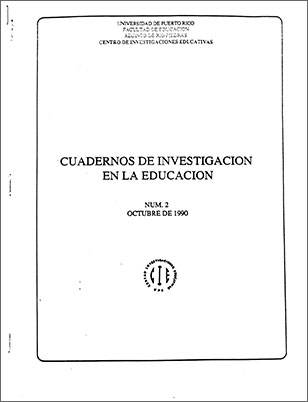Résumé
Cómo citar:
Vázquez Rodríguez, I. (1990). Consideraciones en torno al desarrollo de programas de inducción. Cuaderno de Investigación en la Educación, 2, 23- 32. Recuperado a partir de https://revistas.upr.edu/index.php/educacion/article/view/16356
Références
Departamento de Instrucción Pública (1972). Informe Sobre el Personal Docente que Abandonó el Sistema de Instrucción Pública.
Ervay, S. C. (1985). Campus field-compatibility in student-teaching. Action in Teacher Education, _. 37-41.
Estado Libre Asociado de Puerto Rico. Cámara de Representantes. Sustitutivo de la Cámara al P. de la C. 847, 1lma. Asamblea Legislativa, 3era. Sesión Ordinaria. (1990).
Fox, S. M., y Singletary, T. J. (1986). Deductions about supportive induction. Journal of Teacher Education, 37(1), 12-15.
Friske, J. S., and Combs, M. (1986). Teacher induction program: An Oklahoma perspective. Action in Teacher Education, 8(2), 67-74.
Griffin, G. A. (1985). Teacher induction: Research issues. Journal of Teacher Education, 36(1), 42-46.
Hall, G. E. (1982). Induction: The missing link. Journal of Teacher Education, 33(3), 53-55.
Hegler, K. J. y Dudley, R. (1987). Beginning teacher induction: A progress report. Journa l of Teacher Education, 38(1), 53-56.
Hitz, R. y Roper, S. (1986). The teacher´s first year: Implications for teachers educators. Action in Teacher Education, VIII(3), 65-71.
Hoffman, J. V., Edwards, S. A., O‘Neal, S., Barnes, S. y Paulissen, M. (1986). A study of state mandate beginning teacher programs. Journal of Teacher Education. 37(1), 16-21.
Huling-Austing, A. L. (1986). What can and cannot reasonably be expected from teacher induction programs. Journal of Teacher Education. 37(l), 2-5.
Irving, G. (1990). Collaborative teacher education. Phi Delta Kappan, 71(8), 622-624.
Jones, B. J. y Schiff, S. J. (1989). The winning PACT: A higher education and school district partnership. American Association of Colleges for Teacher Education.
Kurtz, W. H. (1983). How the principal can help beginning teachers. NASSP Bulletin. 67(459), 42-45.
López de Méndez, A. (1987). What teachers learn during the first years of teaching: The perspective of Puerto Rican teachers. (Qualifying paper, unpublished).
Marshal, B. (1985). R&DCTE Pilots beginning teacher program; Research yields new insights into induction. R&DCTE Review. 3(3), 3-6.
Mc Evoy, B. y Morehead, M. (1987). Teacher induction: What can a university do best? Action in Teacher Education. 8, 45-49.
Odell, S. J. (1986). Induction support of new teachers: A functional approach. Journal of Teacher Education. 37(1), 26-29.
Odell, S. J. and Others (1986-87). Functional approach to identification of new teacher needs in an induction context. Action in Teacher Education, 8(4), 51-57.
Rossetto, C. R. y Grosenick, J. K. (1987). Effects of collaborative teacher education: Follow up of graduates of a teacher induction program. Journal of Teacher Education. 38 (2), 50-52.
Schlechty, P. C. (1985). A framework for evaluating induction into teaching. Journal of Teacher Education. 36(1), 37-41.
Thomas E. Robinson Beginning Teacher Induction Center. Glassboro State College, Glassboro, N.J.
Torres, L. (1964). Motivaciones que inducen a los maestros a abandonar el sistema de instrucción pública y su relación con ciertas variables. Tesis sin publicar, Escuela Graduada de Administración Pública, Universidad de Puerto Rico, P. R.
What is the new teacher project? (1989, febrero). Newsletter of the California Teacher Project, 1(1).
Zaharías, J. A. and Frew, T. W. (1987). Teacher induction: And analysis of one successful program. Action in Teacher Education. IX(l ), 49-55.
El contenido que aparece en la Revista de Educación de Puerto Rico se distribuye gratuitamente y está disponible bajo las prácticas de acceso abierto, de acuerdo con la licencia de Creative Commons, Atribución-NoComercial 4.0 Internacional (CC BY-NC 4.0). Mediante estos principios, la revista y sus autores permiten a los lectores acceder, reproducir y compartir los textos completos de los artículos. Los usuarios deben dar crédito a los autores de forma razonable sin sugerir que tienen el apoyo de ellos. Bajo ninguna circunstancia, los lectores pueden hacer uso de los contenidos con propósitos comerciales. Los autores conservan los derechos de autor sobre sus trabajos.

